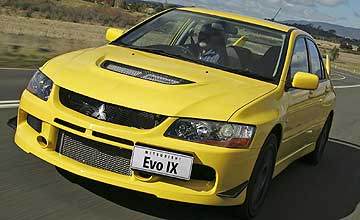BY MARTON PETTENDY | 24th Aug 2005

Lighter, more powerful, quicker, more refined, dynamically superior, better equipped and packing a high-tech new security tracking system, the new-look Evo IX sedan will be available in unlimited numbers at the unexpectedly low price of $56,789.
That's just $150 more than the Evo's fiercest traditional rival in Subaru's Impreza STi and about $5000 less than its unhomologated, limited-edition Evo VIII predecessor - 100 examples of which were made available from June 2004 at $61,990.
Importantly, the sub-$57,000 sticker price puts the first full-time Evo under the luxury car tax threshold.
As such, Mitsubishi is confident Evo IX will be as successful as Subaru's popular STi by selling between 40 and 50 per month or around 500 examples annually.
Apart from a cleaner, more frugal, more flexible and more powerful new engine and six-speed manual (see engine breakout), Evo IX benefits from new inverted MacPherson front struts, a slightly lower ride height, Sports ABS with EBD, 200 extra spot welds, double-sealed weather strips and extra dash sound proofing.
A new underfloor aero package is claimed increase stability and brake cooling by reducing lift to near negative up front and actually creating downforce at the rear.
New Enkei 17x8.0-inch five double-spoke alloys are each 150g lighter (the $3700 Bilstein/BBS Performance Pack wheels are 1.1kg lighter again), while Super AYC further improves on Evo's active yaw control system by splitting torque left to right and employing planetary, rather than bevel, gears.
Evo IX employs the same electronically controlled active centre differential with standard 50/50 torque split and switchable tarmac/gravel/snow modes, and the same 320/300mm front/rear brake discs with four/twin-piston front/rear Brembo callipers.
Evo IX's new look comprises a new mesh grille with floating triple-diamond logo, new bumpers, darker headlights, new wheels and an aggressive rear air diffuser.
Evo IX is equally new inside, where there's a new dashboard with carbon-look trim, titanium-look console highlights, climate control, six-CD/six-speaker audio, aluminium pedal covers, leather-bolstered Alcantara sports seats (leather was formerly optional).
Along with a new, locally-developed telematics-based tracking system dubbed Diamond Trac, which mounts discreetly on the A-pillar and provides 24/7 call centre service and remote disabling technology, Evo IX comes with Mitsubishi's five-year bumper-to-bumper warranty/roadside assist and 10-year drivetrain warranty.
Throw in Datadot vehicle identification and what Mitsubishi calls "a holistic Evo experience" - via a full Evo accessories range, merchandise, Ralliart and Evo owners' club website access and forthcoming drivedays - and the new Evo represents outstanding performance car value.
Evo XI bristles with new tech
Launched at Phillip Island last week, the Evo IX sedan gains substantial updates over the Ralliart Evo VIII.Powered by an upgraded, MIVEC-equipped and Euro4 emissions-compliant version of Mitsubishi's 2.0-litre 4G63 turbocharged and intercooled inline four-cylinder, Evo IX produces 206kW at 6000rpm and 355Nm of torque from 3000rpm.
That's up 11kW on Evo VIII (195kW/355Nm), but down 18Nm on its Evo VI forebear (206kW/373Nm) launched here in May 2001.
The new MIVEC engine features a three-jet intercooler (previously two-jet), a revised turbo with extended diffuser, longer sparkplugs, a two-piece oil ring (was three), a quieter rocker cover and bell housing cover, higher-flow fuel pump, stronger timing belt and a larger catalytic converter.
Mated to a six-speed manual transmission (previously five-speed) and the same short 4.583: final drive ratio, the result is more midrange driveability thanks to MIVEC, with 80-120km/h acceleration dropping from nine seconds to just 6.6 in fourth gear.
Improved top-end power from reduced reciprocating mass and a harder-punching turbo - as well as a 60kg kerb weight reduction from 1470 to 1410kg thanks to a 4kg-lighter aluminium roof and side intrusion bars plus lighter wheels - have reduced Evo's 0-100km/h acceleration time by almost half a second, from 6.1 to 5.7 seconds.
Mitsubishi claims Evo has the best power-to-weight figure in its class at 146kW per tonne (206kW/1410kg), compared with Evo VIII's 133kW/tonne (195kW/1470kg) and the STi at 132kW/tonne (195kW/1475kg).
Despite the extra performance, average fuel consumption drops from 10.9 to 10L/100km.